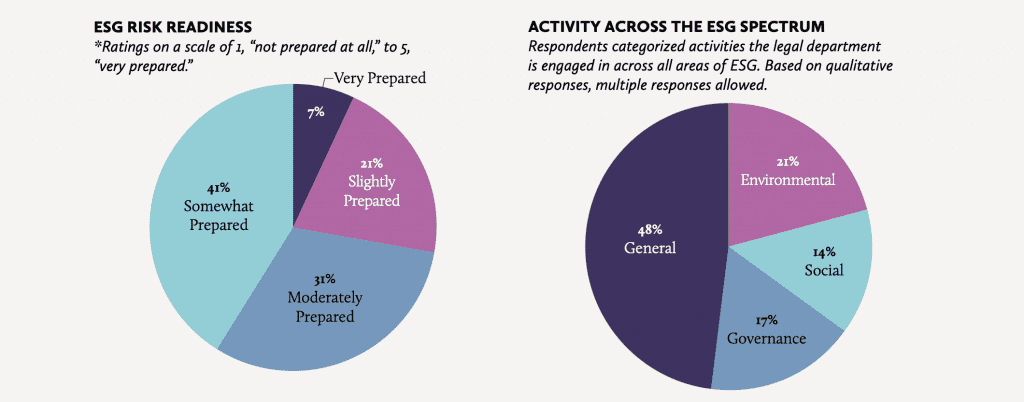Companies’ approaches to the environmental, social, and governance (“ESG”) elements of their businesses are coming under the microscope, as consumers, investors, and regulators ramp up demands that companies bring greater sustainability and transparency to their operations. One need not look further than efforts by lawmakers to see that change is afoot. Legislation is coming in the form of the European Supply Chain Act, which will soon see the European Union require thousands of large companies to actively identify and reduce human rights abuses and ESG issues in their supply chains, and the passage of the German Supply Chain Due Diligence Act in 2021. At the same time, companies are coming under fire for their alleged ties to labor abuses in China and Myanmar and for their alleged practice of “greenwashing” their marketing campaigns to dupe consumers.
Amid such mounting legislative and PR-driven pressures, companies’ counsels have ESG on their radar. This is what FTI Consulting found in its latest survey of chief legal officers across a range of industries and geographies, which focused on “critical pressure points” for global legal departments. In connection with the survey, the Washington, DC-based business consultancy found that ESG is top of mind for companies’ counsels, as they are increasingly being tasked with “monitoring the regulatory and statutory landscape within their specific industry and operations to identify and manage ESG risk for the foreseeable future.”
ESG, Legal Risks & the Evolving Role of the GC
Specifically, more than half (57 percent) of the chief legal officers ranked ESG as one of their top five legal risks. (Other commonly cited risks include supply chain disturbances (which are closely tied to ESG), reputational matters, shareholder lawsuits, commercial interruptions, privacy violations, data breaches, and employee movement.) Looking at the role of risks on a year-over-year basis, FTI found that mentions of ESG-specific concerns are up 20 percent compared to its 2022 survey, which suggests that “ramping pressure is evident.”
Not limited to “monitoring the regulatory and statutory landscape within their specific industry and [company] operations to identify and manage ESG risk for the foreseeable future,” companies’ counsels say that they have taken on a wider range of responsibilities across ESG issues – “from risk management, to value setting, to refining recruitment strategies and implementing best practices.” And the GC role goes so far in at least some cases that lawyers have a “direct responsibility” for companies’ “ESG messaging and activities.”
In short: Some respondents cited the general counsel as being responsible for “ensuring ESG coverage, consistency and compliance across the entire organization,” with many pointing to their role as “driving forward ESG-related initiatives.”
In addition to their expanding role when it comes to ESG, the respondents revealed that pressures in the realm of ESG are rising. While the surveyed lawyers – who were interviewed between August and September 2022 – agreed that managing risk is a “fundamental responsibility” for legal department leaders, FTI found that the “rapidly shifting business climate, striking uncertainty and the heightened focus on compliance in privacy, data security, regulation and ESG” have increased pressure on them with regards to ESG.
From a practical POV, this means that ESG is impacting the allocation of resources; some companies are establishing specific ESG offices within the legal department, for instance, with one respondent saying that the company “created a sustainability office that reports into the general counsel and has a chief sustainability officer.” At the same time, while demand is generally increasing across almost every legal function, ESG is among the most notable areas of “increased workloads and pressure,” with 100 percent of the surveyed lawyers listed ESG as a key area driving rising demand.

Delving into the state of ESG activities, 75 percent of respondents said that they spend up to 10 percent of their time on ESG-related issues, while 25 percent said that ESG commends more of attention, amounting to 11 percent to 20 percent of their time.
It is worth noting that … there is almost certainly overlap between ESG-specific tasks and other key areas where lawyers are spending their time, including compliance monitoring, regulatory investigations, and “other business strategy and risk management activities,” which likely means that the amount of time/effort allocated to ESG may be even greater than initially meets the eye.
And chances are, these time frames are likely to increase in light of companies’ overarching lack of preparedness for rising ESG requirements and risks. FTI found that the level of legal department preparedness for the increases in risk and demand vary widely across key areas. For example, legal teams’ preparedness to handle risks relating to data privacy and cybersecurity increased, whereas their preparedness for responding to “ESG requirements” remains relatively low. Just 7 percent of respondents said they feel “very prepared.”
The Impetus for, Challenges of ESG Attention
Attention to ESG among legal departments is also slated grow even further given how businesses, themselves, are treating ESG. According to respondents, some 60 percent of companies are treating ESG as a “business priority” because companies are being measured in this area, and the quality of their efforts is increasingly linked to their business success. “Investors will screen a company for ESG risk, and if you don’t score well enough, they will not fund the company; customers are also increasingly asking ESG questions on request for proposals, and if you cannot check all the boxes, you cannot succeed,” advised one law department leader.
For some companies, attention to ESG is imperative as it makes up a central element of operations. “We make sure that the legal team is looking at the evidence of the claims that are being published, and also audit social media to assess the messaging,” said one respondent. “We are not preparing for it because of the scrutiny; rather, we are preparing for it because of the mission of our business.”

Others are focused more squarely on ESG because they are “acutely aware” that their efforts are increasingly subject to external scrutiny from consumers. “We invest a lot of effort into it and are very concerned about our ESG ranking,” according to respondent said. “We are a young company and there is a demand for the company to be social advocates and make an impact; it is a company image and employee interest issue,” said another.
As for challenges, swiftly rising demand for ESG attention is, of course, a critical one for legal departments, which say that they are experiencing “a strain on capacity, resources and budgets, often as a result of the growth that their organizations have driven over the past two years.” 23 percent of respondents said that they are responding to overarching capacity restraints by increasing budgets. Several respondents revealed that they are either expanding their team or upgrading systems to enhance compliance on the ESG front. For example, one chief legal officer said, “We are hiring more ESG-focused specialists and those familiar with technology and analytics.”
Speaking specifically about ESG, one respondent said, “When I think about ESG, it doesn’t impact spending, but it impacts the allocation of resources, and the general counsel needs to ensure coverage across the entire organization. Everyone wants to talk about ESG and you need consistency. So, the increase in the need to be vocal on these topics will increase the need for legal review.”
Beyond that, counsels cited the logistics of navigating the scope of ESG – and tracking their efforts – as “more confusing than embracing the fundamental values associated with it.” One respondent said that the legal department “wants to assign what we are doing into ESG categories,” but is “concerned that we don’t fully appreciate the extent of what ESG means aside from diversity and inclusion.” Another stated that the company is “do[ing] many things that support ESG, which we are not properly tracking,” suggesting an overarching need for improved tracking mechanisms. Still yet, a respondent revealed that the wide range of areas that ESG covers presents a challenge in driving and measuring transformation throughout an organization: “ESG is tricky, because what ESG is for one organization may not be the same to another, so until there is a uniform score card, addressing ESG will be inconsistent.”
Looking ahead, advancements are expected, with one attorney aptly stated, “We are in a period where companies will better understand what ESG is and is not, as well as how to navigate these things; the general counsel’s office is well prepared to help companies with inconsistent, inaccurate and incomplete disclosures on ESG, because it is so top of mind by leaders and shareholders.”











